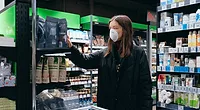NEHA-FDA Retail Flexible Funding Model Grant Program

One of the central features of both the public health enterprise and the work of most public health regulatory programs is retail food safety. However, regulatory programs often face a large barrier to committing more time and resources to building their capacity and reinforcing their retail food safety programs. The National Environmental Health Association (NEHA) and the U.S. Food and Drug Administration (FDA) are excited to share that beginning this fall, a new opportunity offering abundant financial support to advance conformance with the Voluntary National Retail Food Regulatory Program Standards (VNRFRPS or Retail Program Standards) will become available. The NEHA-FDA Retail Flexible Funding Model (RFFM) Grant Program is designed to support state, local, tribal, and territorial retail food regulatory agencies as they work to achieve conformance with the Retail Program Standards. The new NEHA-FDA RFFM Grant Program will offer customizable approaches which enable grantees to design a program that best suits their capacity and ambitions.
Overview of Funding
Beginning in fall 2021, NEHA, in partnership with FDA, will assist retail food regulatory agencies in their efforts to reduce the occurrence of foodborne illness and increase conformance with the Retail Program Standards. During the 3-year award cycle, jurisdictions will be able to apply for one of two levels of base grant funding and up to four optional add-on grants. Jurisdictions will fall into one of three eligibility tracks, based on their experience and achievements in the Retail Program Standards.
Applicants who are newly enrolled in the Retail Program Standards can apply for Track 1 Development Base Grant funding, with opportunities to request funds to complete a self-assessment of all nine Standards (SA9) or a Comprehensive Strategic Improvement Plan (CSIP), receiving up to $5,000/year/grantee. Applicants following this track will also have the option to apply for two optional add-on grants to be a mentee and/or attend one of FDA’s Self-Assessment and Verification Audit Workshops.
Jurisdictions with more experience, who have already completed an SA9, and who complete a CSIP to attach to their application (guidance can be found on the NEHA-FDA RFFM Grant Program website), can apply for Track 2 Development Base Grant funding to pursue continuous improvement with the Standards and Elements, receiving up to $5,000/year/grantee. These jurisdictions will also have the option to add on public health metric funding, offering up to an additional $5,000/year/grantee, to complete a foodborne illness risk factor study or equivalent public health measure, or to develop and implement an intervention strategy based on a risk factor study or equivalent public health measure.
Jurisdictions that have a current SA9, complete a CSIP, and have met and verified at least one Standard during their most reason self-assessment period will qualify to apply for Track 3 Maintenance and Advancement Base Grant funding, offering 3 years of funding with the following options:
- Up to $3,000 per grantee for completion of a repeat SA9;
- Up to $3,000 per Standard per year for continuous improvement (achieving elements within one or more Standards);
- Up to $10,000 per Standard per year to achieve conformance with one or more Standards by the end of the 3-year funding cycle; and/or
- Up to $5,000 per Standard per year to maintain conformance with one or more Standards.
In order to select any of the above Track 3 options, applicants who have not already met Standard 9 are required to select one of two public health metric variable funding rates, offering up to $10,000 per year to complete a risk factor study, perform data collection and analysis, and implement one or more intervention strategies based on a risk factor study or equivalent public health metric.
Track 2 and Track 3 applicants will also be able to apply for all four of the optional add-on grant available, including:
- Mentorship: Up to $14,000/year/grantee for Mentees and up to $24,000/year/grantee for Mentors;
- Training/Staff Development and Program Standards Engagement: Up to $7,500/year/grantee;
- Special Projects: Up to $20,000/year/grantee; and/or
- Capacity Building: Up to $100,000/year/grantee for a 3-year grant cycle.
Further details regarding supported activities, eligibility requirements, expected outcomes, and exceptions will be made available on the NEHA-FDA RFFM Grant Program website.
New Grant Program
NEHA’s grant management process is designed to be people-centered with an emphasis on simplicity and accessibility. Applicants to the new NEHA-FDA RFFM Grant Program can expect:
- enhanced technical assistance and retail subject matter expertise guidance, throughout the grant cycle, in partnership with FDA and experienced retail food subject matter experts;
- a NEHA-FDA RFFM Mentorship Program in partnership with the National Association of County and City Health Officials; and
- dedicated educational programs to address advancement and conformance with the Retail Program Standards in partnership with the Conference for Food Protection.
Prepare for a Successful Application
Looking for quick answers on food safety topics?
Try Ask FSM, our new smart AI search tool.
Ask FSM →
NEHA is committed to ensuring a comprehensive and clear application process. There are five significant components retail jurisdictions will need awareness of to prepare a successful application.
First, both the Track 3 Maintenance and Advancement Base Grant and the optional add-on Capacity Building Grant offer significant annual funding for jurisdictions and have a mandatory three-year project period. These two grant types will only be available during the fall 2021 NEHA-FDA RFFM Grant Program application period. For these two grant types, applicants must apply in the fall of 2021 in order to receive this type of funding for the next 3 years.
Second, for jurisdictions who have not yet met Standard 9, choosing to pursue a public health metric outcome is a requirement to apply for Track 3 Maintenance and Advancement Base Grant funding. Once the NEHA-FDA RFFM Grant Guidance is released, jurisdictions must carefully read the requirements for the two levels of public health metric variable funding rate assistance offered to be sure they are ready to pursue this work. If not, pursuing Track 2 Development Base Grant funding will likely be the better choice for that jurisdiction.
Third, applicants must have a current (within the past 5 years, September 2016 or later) SA9, unless applying for Track 1 Development Base Grant funding. More information about the self-assessment is available on the FDA VNRFRPS website under the Self-Assessment/Audit Verification Summary and Gap Analysis Tool.
Fourth, to apply for the higher funding-level opportunities offered through Track 2 and Track 3, jurisdictions must complete a CSIP and submit it as an attachment to their grant applications. The CSIP is a jurisdiction’s plan to fill in gaps to meet the requirements for each of the Standards as identified in their SA9. It should include steps that will be taken to address gaps, timelines for beginning and achieving those steps, resources needed to accomplish each task, and identification of the parties responsible for overseeing steps and tasks. FDA has provided an optional template for the development of a CSIP, which can be found on the NEHA-FDA RFFM Grant Program website.
Finally, ahead of the NEHA-FDA RFFM Grant Program application portal opening (fall 2021), FDA Retail Food Specialists are currently supporting jurisdictions with the development of the Written Project Implementation Plan (WPIP). More information about this important document will be available on the NEHA-FDA RFFM Grant Program website. To ensure we are following our people-centered, simplicity, and accessibility approach, we are working to integrate most of the required elements of the WPIP into our application portal for all three of the funding tracks. If a jurisdiction has completed the WPIP in advance of the application process, most of that information can be copied into NEHA’s application portal.
NEHA is committed to supporting jurisdictional retail food protection agencies in their efforts to reduce the occurrence of foodborne illness and implement conformance with the Retail Program Standards. For the most up-to-date information and the answers to frequently asked questions, visit our webpage.
For additional inquiries, please contact our NEHA-FDA RFFM Grant Program Support Team via email at retailgrants@neha.org or toll-free at 833.575.2404.
Terryn Laird is a Public Health Communications Specialist at NEHA.








